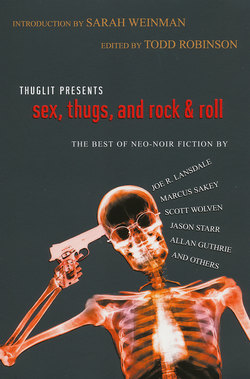Читать книгу Sex, Thugs, and Rock & Roll - Todd Robinson - Страница 6
На сайте Литреса книга снята с продажи.
Introduction Sarah Weinman
ОглавлениеIt’s a strange time to be a writer of short mystery fiction. On the one hand, print magazine outlets have dwindled to the point where longtime stalwarts Ellery Queen and Alfred Hitchcock are still just about the only places to get paid a decent wage. On the other hand, thanks to Akashic’s “City Noir” series and upstart small presses like Busted Flush Press and Bleak House Books, the anthology market is so glutted that I pity anyone judging the short story category for the Edgar Awards.
But if you’re a writer and your voice and style doesn’t fit EQMM or AHMM’s guidelines, if you don’t have an in with specific editors or if you’re still not known enough to be picked up by one of the themed anthologies sponsored by the major crime writing associations, where do you go?
For the last few years, the answer is online.
It took a while for that answer to gain any sort of traction. Like any new medium, the Web was greeted within publishing circles and by would-be authors with skepticism and scorn, and often for good reason: poor presentation, questionable editing, and seeming instability. Many heralded early players like Blue Murder, HandHeldCrime, and Plots with Guns no longer exist; others have severely curtailed activity or dropped fiction altogether. For those that remain, creating their own distinct presence, adopting strict editorial guidelines and producing quality fiction, what still remains a sticking point is the lack of cash—the equivalent of a couple of high-priced beers if the writer’s lucky.
So why go online?
Several reasons. First, it gives undiscovered writers a wonderful opportunity to get their unique voices heard and distributed to, potentially, a bigger audience than a tiny print magazine that goes out of print after a month. Second, because of the dwindling print markets, more publishing professionals are looking to the Web for talent and quality. I can name example after example: Scott Wolven, whose stories have almost exclusively been published online, has been included in six consecutive editions of the Best American Short Stories, published a collection of short stories with Scribner, and has a novel in the works with Otto Penzler’s imprint at Harcourt. Allan Guthrie, who went from publishing his first story online to three-book deals with Harcourt and the Scottish publisher Polygon. Ray Banks, following Guthrie’s trajectory almost note-for-note; and Dave White, moving from critical acclaim for his Jackson Donne short stories to similar acclaim for his Jackson Donne novels published by Three Rivers Press.
The Web has become a haven of experimentation and risk—of stories that don’t quite fit a particular mold. It’s inspired a new wave of noir and allowed younger writers to have their voices heard, and there’s no better example of this than Thuglit. From the moment Todd Robinson launched this online magazine in late 2005, I’ve been impressed with the caliber of stories, the quality of prose, and the gut-wrenching emotions that pulsate on the virtual page. No wonder Thuglit made the jump to print format, mixing all manner of dark doings originally published online with original stories by the brightest (or is that blackest?) stars of contemporary noir like Wolven, Guthrie, Joe R. Lansdale, Jason Starr, and Marcus Sakey.
The big guns may be the draw to entice readers to open this anthology’s pages, but the reprints—from Jónas Knútsson’s knucklebuster tale of a Budapest brawler to Justin Porter’s depiction of Mexico City at its seediest to Patricia Abbott’s sly twist on noir conventions—are the meat of Sex, Thugs, and Rock & Roll, dripping so much blood and guts and marrow that it’s impossible to read this book in more than a single sitting. Be prepared to be shattered, shell-shocked, and bruised as Thuglit’s emissaries continue to write wrongs that are very, very right.
